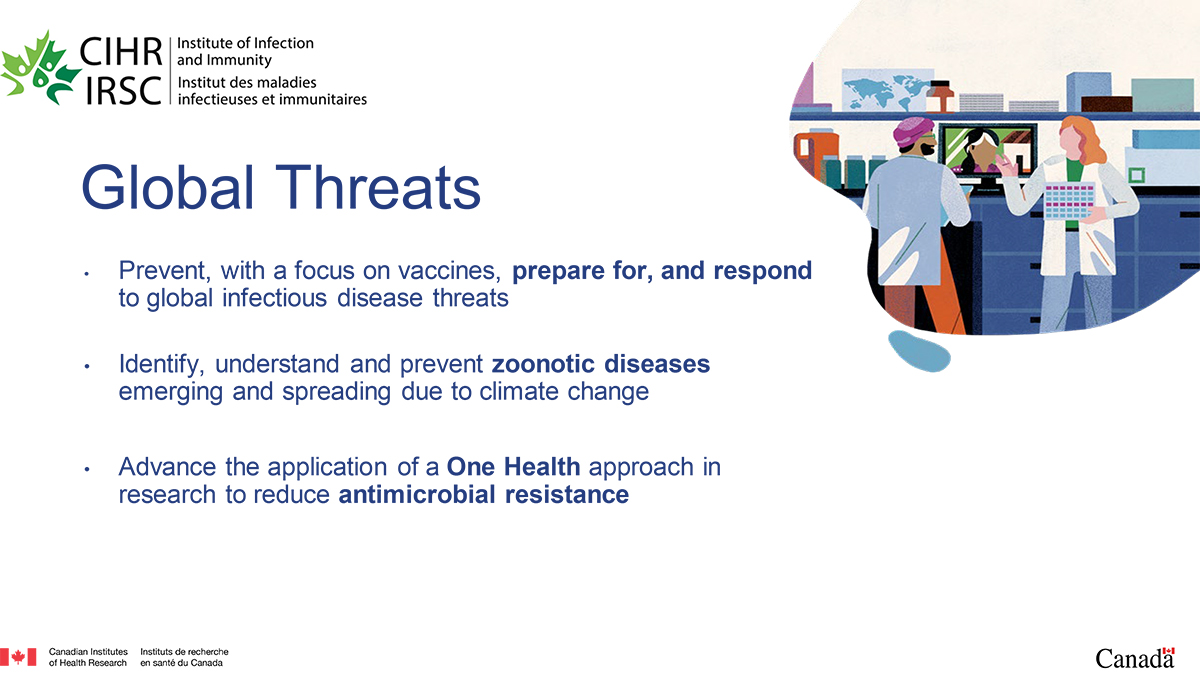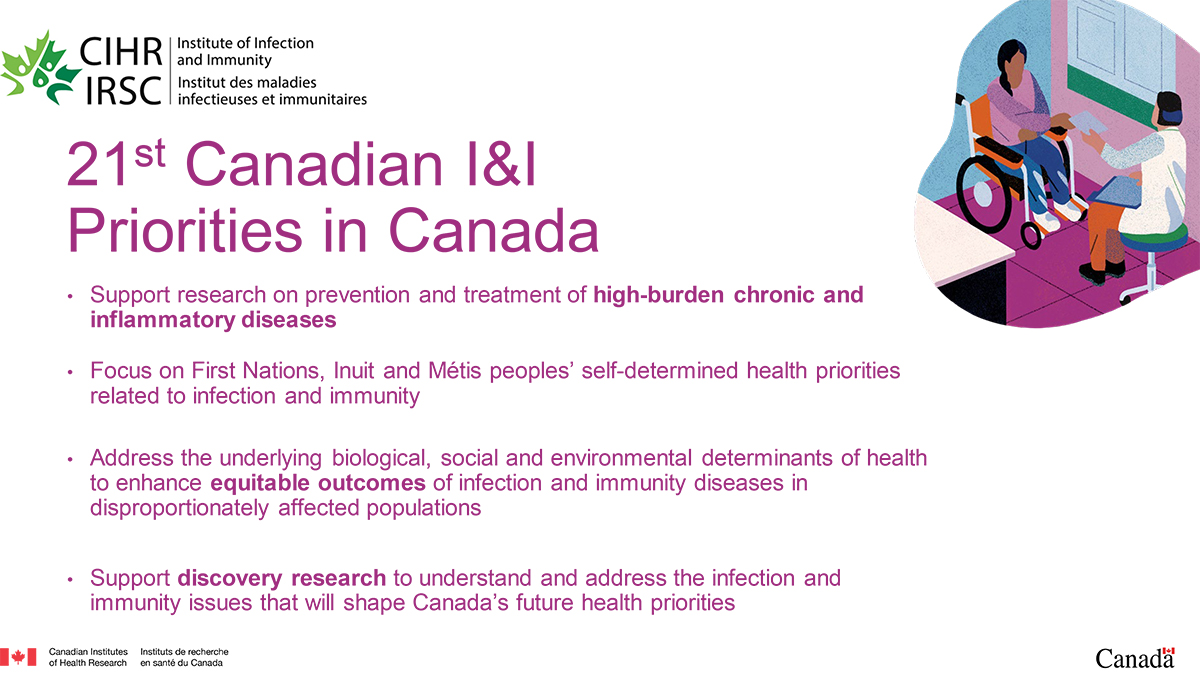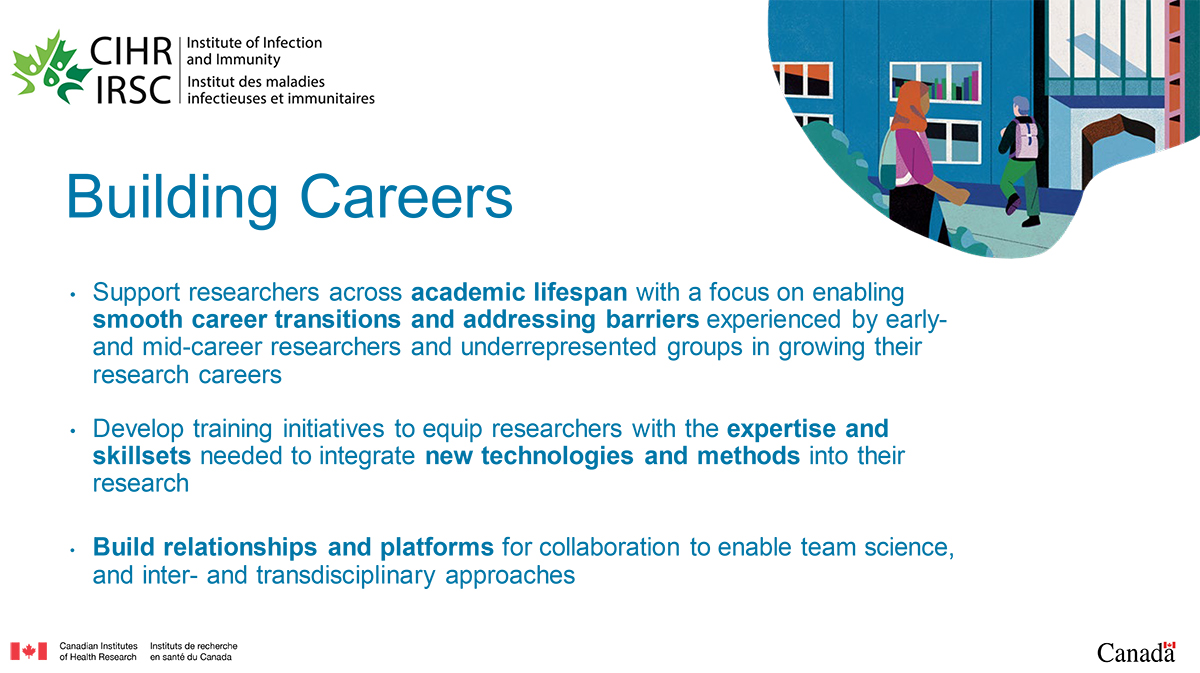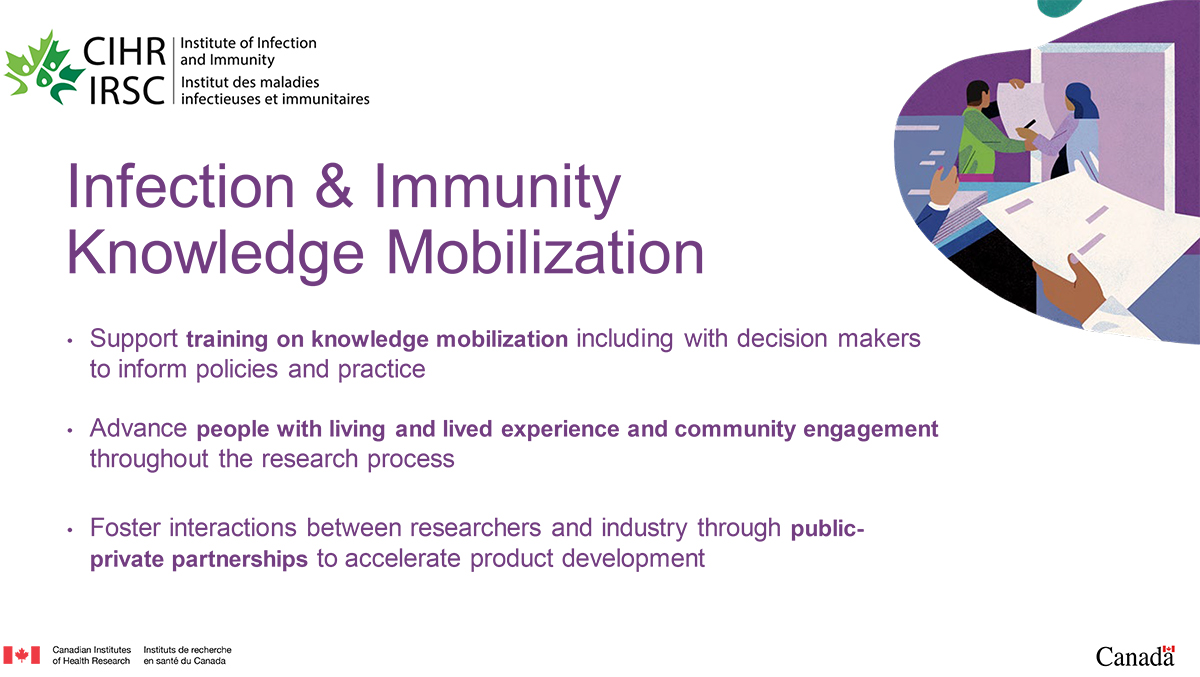CIHR-III Strategic Plan 2021–2026: Shareable content
Transforming Research to Impact Lives: Our Vision for the Future
Browse through our collection of one-pagers, infographics, and social media content.
Infographic
Vision
Excellence in infection and immunity research that leads to equitable health outcomes for people in Canada and around the world in the 21st century.
Mission
To establish, engage and mobilize an inclusive, collaborative and diverse research community focused on excellent research that addresses infection and immunity priorities in Canada and beyond.
Strategic Goals

Strategic Goal: Global Threats
Position Canada as a Leader in the Research Response to Global Infectious Disease Threats
Strategic Priorities
- Prevent with a focus on vaccines, prepare for, and respond to global infectious disease threats.
- Identify, understand, and prevent zoonotic diseases emerging and spreading due to climate change.
- Advance the application of a One Health approach in research to reduce antimicrobial resistance.
Strategic Goal: 21st Century Infection & Immunity Priorities in Canada
Realize the Full Potential of Infection & Immunity Research to Improve the Future Health of All Canadians
Strategic Priorities
- Support research on prevention and treatment of high-burden chronic and inflammatory diseases.
- Focus on First Nations, Inuit and Métis Peoples’ self-determined health priorities related to infection and immunity.
- Address the underlying biological, social and environmental determinants of health to enhance equitable outcomes of infection and immunity diseases in disproportionately affected populations.
- Support discovery research to understand and address the infection and immunity issues that will shape Canada’s future health priorities.
Strategic Goal: Building Careers
Enable the Current and Next Generation of Researchers to Collaborate and Lead in the Evolving Infection and Immunity Research Environment
Strategic Priorities
- Support researchers across academic lifespan with a focus on enabling smooth career transitions and addressing barriers experienced by early- and mid-career researchers and underrepresented groups in growing their research careers.
- Develop training initiatives to equip researchers with the expertise and skillsets needed to integrate new technologies and methods into their research.
- Build relationships and platforms for collaboration to enable team science, and inter- and transdisciplinary approaches.
Strategic Goal: Infection & Immunity Knowledge Mobilization
Foster and Enable Knowledge Mobilization and Implementation of Research Results
Strategic Priorities
- Support training on knowledge mobilization including with decision makers to inform policies and practice.
- Advance people with living and lived experience and community engagement throughout the research process.
- Foster interactions between researchers and industry through public-private partnerships to accelerate product development.
Cross-Cutting Principles
Equity, Diversity & Inclusion (EDI)
Together we will foster a research culture that realizes the full benefit of Canada’s diverse talent pool.

Collaborations & Partnerships
Together we will leverage infection and immunity funding and strengthen Canada’s position as a global leader and key research collaborator.

Communications & Engagement
Together we will continue to grow the infection and immunity research community’s reputation as a reliable source of accurate and timely information and promote the benefits of science and research for our society.

Monitoring & Learning
Together we will assess Canada’s progress towards new knowledge, policies, practices, programs, and products that will help inform decisions on new initiatives and ultimately strengthen the infection and immunity research environment in Canada.

Video
Transcript
[00:00:09] - Dr. Charu Kaushic: After hearing from seven hundred and fifty stakeholders and many others through the last 18-month process – we've titled, after a lot of thinking, the program as Transforming Research to Impact Lives. It's a vision for the future.
This is the new way that III will function, where we will be continuously listening. We will come back and have a more meaningful dialogue with a lot of people. So you will have lots of opportunities to talk to us.
[00:00:43] - Dr. Shelly Bolotin: I saw the institute work really hard, even in the throes of the pandemic, to understand what our needs were. Throughout the process I felt that my suggestions and concerns were heard, and seeing them reflected in the strategic plan is incredibly meaningful to me.
[00:00:57] - Dr. Trevor A. Hart: This plan isn't just about talk, but it's also about action, it's about action to repair damage that's been done but also to say "hey, what can we do to build a better Canada?" and a better Canada built by diverse scientists that represent all of us in Canada.
[00:01:20] - Dr. Jeannie Shoveller: This plan positions this institute and its community to be national and global leaders in infectious disease and immunity research, reflecting what we are today and inspiring what we can become into the future.
[00:01:37] - Dr. Michael Strong: Even before COVID-19 struck in 2020, six of the top thirteen most urgent threats to global health were either driven by infectious diseases, or were linked to infection and immunity related challenges.
[00:01:49] - Dr. Karen Mossman: The III is helping to advance the impact of our work, accelerating our research and our ability to provide the best available evidence to decision makers nationally and around the world.
[00:02:04] - Dr. Brian Ward: Academic industry collaborations can work, they do work, you have to understand each other.
[00:02:11] - Dr. Marianne Stanford: It would be training of academic researchers a little bit to understand the process of getting products from discovery through to clinical trials and then eventually through to the public. But also training trainees. Really focusing training beyond lab experiments to really sponsor the bio economy.
[00:02:32] - Dr. Mounia Azzi: Pharma needs academics, biotechs need academics. I think that it takes really a village to raise a child and it takes also a village to end up to a product and make a good project.
[00:02:53] - Dr. Manisha Kulkarni: I think in terms of global health research in Canada, it's really necessary to have representation, have meaningful involvement of people from different backgrounds as role models and as decision makers.
[00:03:07] - Dr. Charu Kaushic: This has been really, really thoughtful. We've had these discussions during the strategic planning stages, while many of you engaged. And I hope this will be an ongoing relationship where we can turn to you and many of the others for this advice.
Thank you everyone, and I thank on behalf of our team. I invite you to join us, III team and myself, for our journey forward.
Social media images
To download, right-click and select Save Target As...




- Date modified: